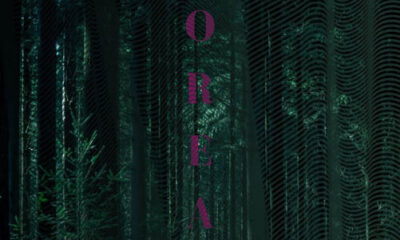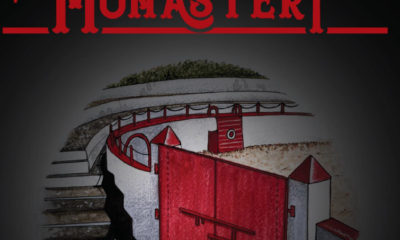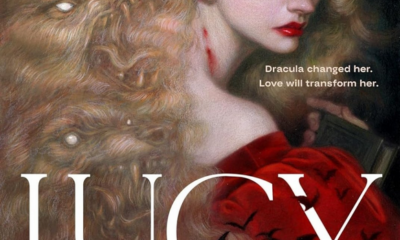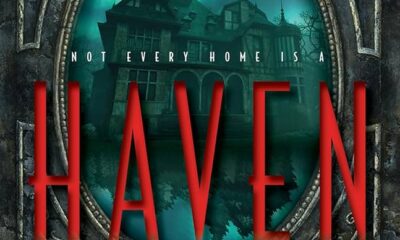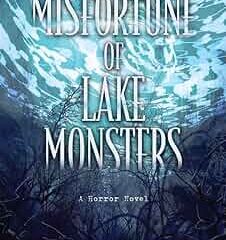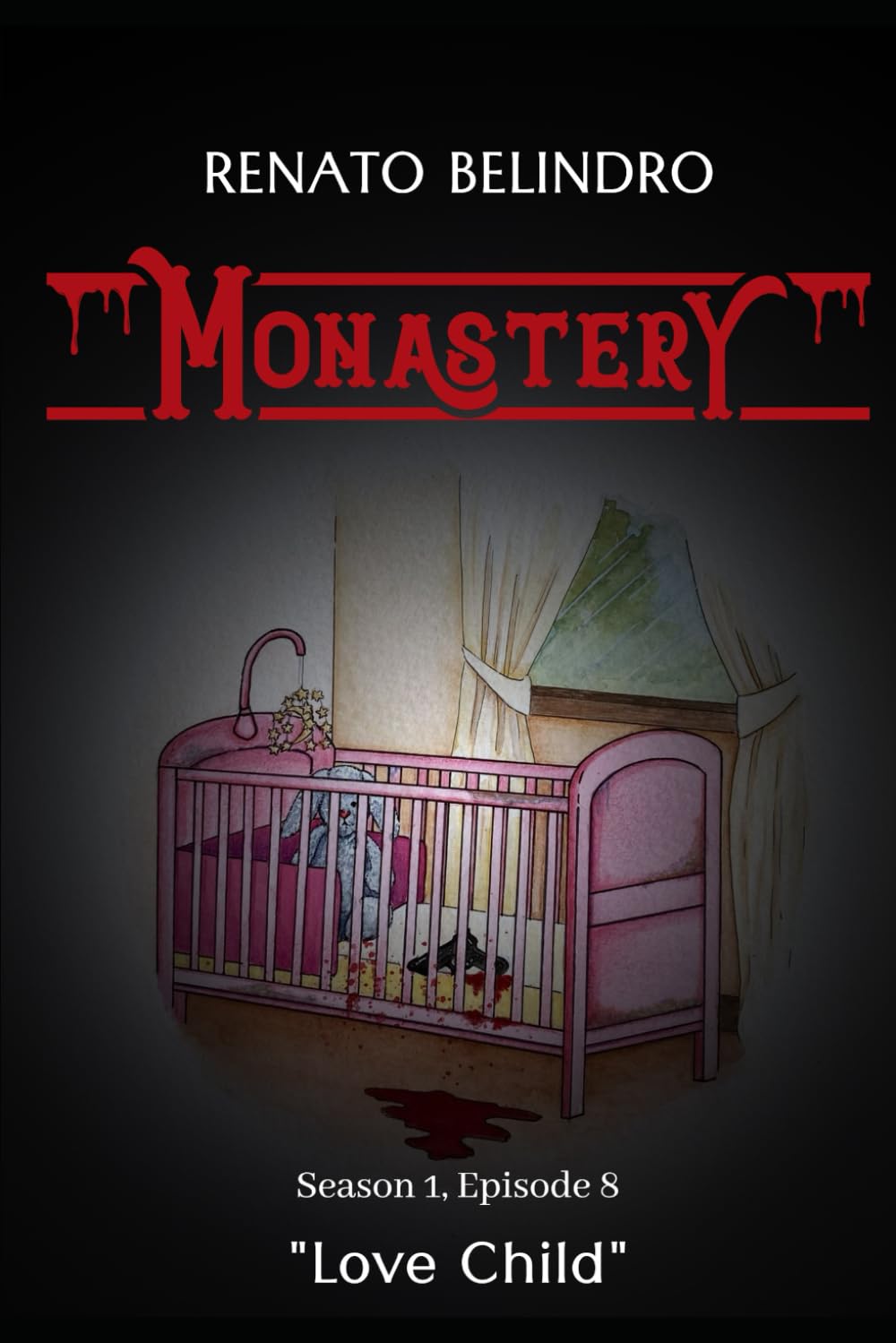
Monastery Series 8: a Book Review
Dear readers, the time has come for some answers. At least, that’s what the teaser for the new installment of Monastery says. As usual, it delivers what it promised and more as we untangle the past and its connection to the present. Without any further ado, let’s talk about it, shall we?
Plot
We start the episode with a blast from the past. Cassandra and Celeste (Nicole’s aunt and Arthur’s lover for those with short-term memory) are in the hospital because of Celeste’s pregnancy complications. Cassandra promises her former best friend that she will ruin her all the while we find out Francis’s real parentage. The picture is finally starting to come together.
As we are back in the present day, our group is more scattered than ever. Thomas is his father Walt’s prisoner while David is still running around looking for Rocky. Fred on the other hand is just looking for any place to crash, homelessness and all. Our dethroned beauty queen Nicole is hiding away from everything – including her shame. Last but not least, little Henry is spending his time taking care of Nana Beth. Guessing that is his redemption for trashing all the evidence of Albert’s murder gathered so far. Although frustrating, his actions are understandable – the poor kid is traumatized and just wants some peace.
George Turner’s murder is still an active investigation. It is obvious that this cover-up wasn’t nearly as successful as Albert’s. I sure as hell hope that Francis gets his comeuppance sooner rather than later. Not particularly because Turner didn’t deserve it but so the rest of the characters would be safe from him. Although as I’ve said before, his clear descent into sociopathic tendencies is kind of fascinating to watch.
We also get an interesting development in what so far has been a tiny background detail, which is the Monastery Werewolf. As the creature comes to visit Rocky, we find out our resident star dog considers it family. Not going to lie, it took me a few reads to understand what this means. Now I’m getting all sorts of ideas as to how the supernatural ties into the rest of the story.
Speaking of the supernatural, it is none other than Madame Witch who frees Thomas from his captivity. Well, her contribution is indirect as she sends his best friend Alfie to help instead. Although I’d say currently the two should set their dynamic status to ‘it’s complicated’. As soon as he’s free, Thomas is immediately back in his detective mode. For arguably the first time he gets some real answers as we find out the whole backstory of Albert/Celeste/Cassandra triangle. I won’t go into details as that trio deserve their own article but let’s just say it gives Cassandra a big ass motive for killing her husband. Not to mention the way she took Francis from Celeste was quite brutal to read.
We reach the lead-on for the grand finale as David and Henry are coming to free Rocky. This naturally comes with a condition – they must hand Francis the key they found during the investigation. Little do they know Nicole is already there being held at gunpoint. Oh, and Fred should also be around somewhere as he was sleeping there the night before. Thomas might be a little late to the party since he and Alfie are held a knifepoint by Rick (seems like a running theme here). Nothing good can come from this.
Overall thoughts
This episode does a perfect job of setting up the big finale. It reveals everything we need to know except the main question – who killed Albert? At this point, while it of course still matters, this story is so much more than that. It’s about all the mess that this family has got themselves into, how with each mistake they kept digging deeper, and how it took a whole new generation for all of that to come up to the surface. I can only hope our investigative gang will make it out alive…
 (5 / 5)
(5 / 5)
More thoughts from the author:
1. Although a minor character in comparison, Walt strikes me as someone who’s there to represent the themes of Monastery – someone who will do horrible things in the name of family. What was your intention with his characterisation, especially considering he works for justice (aka the police?)
This is why I will always defend my decision to have a large cast, as opposed to most books – when you get even the slightest sense of fleshing out a minor character, it feels so rewarding. Walt, to me, takes the crown of “father of the year”, even if he does it by locking his son up in the bedroom. He is protecting his wife’s secret, protecting his son’s innocence, and doing so by going against his core ideals – i.e., a detective covering up a murder. He’s also based on a favourite uncle of mine, so it makes me happy to give him his moment to shine.
2. Something I thought of while writing this review – the cover up of George Turner’s murder seems to be a kind of juxtaposition as to how neatly Albert’s was since the police keep discovering evidence left and right (and how Francis doesn’t particularly seem to care). Was this intentional on your part?
It all adds up to plot convenience, and I have no shame in admitting that – Albert’s murder was so neatly covered up because I needed it to go unsolved for 14 years, whereas the reader knows who killed George, so there is no need for the cover-up to be well done.
As for Francis’ reaction to the murder, he started out anxious and paranoid after the fact, but he has grown into a state of not caring, which further depicts his descent into darkness – he knows he’s close to his goal (of finding the money and leaving his family), so there is a sense of invincibility taking over. He is stepping into his main villain energy and we are here for it!
3. Alfie has been yet another background character until now and yet he is the one who rescues Thomas. To me he seems like the friend who genuinely cares for Thomas and who gives him that reality check he sometimes needs to get out of his own head. Was that at least partially why you chose to bring him in for the grand finale?
Fun fact: Alfie was originally a series regular. However, halfway through writing the series, I realised I wasn’t using him as much as I’d wanted to, so I bumped him down to recurring. But the original plan always saw him and the other regulars coming together for the big climax, which is why he is in the fold. Alfie is someone who keeps Thomas grounded (if not humbled), since Thomas has the slight tendency to, well, think he’s better than everyone else. What’s coming up for them is one of the most exciting things I’ve ever written about.
4. Lastly, it’s not so much a question but rather a well done for how you crafted the Albert-Celeste-Cassandra dynamic! I was very invested despite knowing the outcome. Weirdly enough, while hating Cassandra for how she handled it, I sort of understood why she thought that Celeste deserved it? Either way, congrats for managing to craft these love stories in the midst of all the murdery goodness.
Thank you so much. As I’ve said before, romance is not my strong suit, but I do love a soapy triangle – and if it ends with gun violence, even better! The reveal of this mystery is probably my favourite sequence in the series so far.
Book Reviews
A Stellar Debut Novel, We Used To Live Here
Imagine this. You’re home alone, waiting for your partner to return, when you hear a knock on your door. You answer it to see a family of five, bundled up against the cold. The father, a kindly older gentleman, explains that he used to live in this house as a boy. And he would love to show it to his family.
Do not let them in.
The story
Released in June 2024, We Used To Live Here is author Marcus Kliewer’s debut novel. It tells the story of Eve, who just purchased a beautiful house with her partner, Charlie. Their plan is to flip the house and sell it.
One night, while waiting for Charlie to come home, Eve is surprised by a knock at the door. It’s a man named Thomas Faust and his family.
Thomas explains that he grew up in the house and hasn’t been in the area in years. Would Eve let them in so that he can show the home to his children?
Against her better judgment, Eve lets them in. She regrets this almost at once when Thomas’s daughter vanishes somewhere into the house.
What worked
I always appreciate a book that allows you to play along with the mystery. And this book does that better than just about any other I’ve seen.
Pay close attention to the chapters, to the words that aren’t there. To everything about this novel.
This is mostly down to Kliewer. This is ultimately his work of art. But the production value is also fantastic. I don’t want to ruin the multiple mysteries, so I’ll just say this. There are clues in this book that require some specific artistic choices in the page layouts in this book. And I loved that.
If you’d like to experience another horror book review, check out this one.
We Used To Live Here is also the kind of story that makes you question everything right along with the main character, Eve. Eve is a great main character. But she might be an unreliable narrator. She might be experiencing every single horror described, exactly as it’s described. Or, she might be having a psychotic breakdown. Through most of the book, we can’t be sure. And that is so much fun.
Finally, the weather plays a large part in this story. There are several stories in which the weather or the land itself could be considered a character. Even an antagonist. This is certainly one. The winter storm is the thing that traps the family in the house with Eve. It also makes escaping the home difficult. Reading this book during the winter was especially impactful. Most of us know what it feels like to be shut in by a storm. I’ve personally lived through some of those storms that are just referred to by their year, as though they were impactful enough to claim the whole 365 days for themself. And that was with people I liked. Imagine what it would feel like with strangers. It’s a staggering thought and one that we explore in depth in this book.
In the end, We Used To Live Here is a fantastic book. It’s the sort of story that sneaks into your brain and puts down roots. And if this is just the first book we’re getting from Kliewer, I can’t wait to see what else he comes up with.
 (5 / 5)
(5 / 5)
Book Reviews
Exploring real terror with The House of My Mother
As a disclaimer, this is a review of The House of My Mother from a critical perspective. I will not be discussing my opinions of the legal case against Ruby Franke and Jody Hildebrandt. I will be discussing the merits of the book as a work of true crime alone.
In 2015, Ruby Franke started a YouTube channel called 8 Passengers. In August of 2023, Franke and her business associate Jodi Hildebrandt were arrested for, and later plead guilty to, charges of aggravated child abuse. And in January of this year, Shari Franke told her story in The House of My Mother.
The story
The House of My Mother is the true story of Shari Franke, the oldest child of one of the most famous family vlogger families.
As a child, Shari came to the conclusion that her mother didn’t like her. Soon, she began to fear her mother’s anger.
Things got significantly worse when Ruby started their family vlog. All of the families most intimate moments were splashed across the internet for anyone to watch. This became a living nightmare for Shari.
Of course, that was only the start of the family nightmare. Because Ruby was about to meet someone who would reinforce all of the darkest parts of herself.
Eventually Shari manages to escape her home. But her younger siblings were still in her mother’s clutches. She had to save them, and her father, from the monster her mother had become.
What worked
Through the book, Shari only ever mentions the name of one of her siblings, Chad. This is because Chad is the only of her siblings that is an adult at the time of the publication.
There are children involved in this story. Children who’s lives and privacy have already been damaged. Shari didn’t want to do that to them again, and neither do I.
It probably won’t surprise you that this book is full of upsetting details. But not in the way you might imagine.
Nowhere in this book will you find gory details about the abuse the Franke kids suffered. And I consider that a good thing. Those sort of details are all fun and games when we’re talking fiction. When it’s real kids who are really living with the damage, it’s not a good time.
What you’ll find instead is a slew of more emotionally devastating moments. One that stuck with me is when Ruby’s mother gives her a pair of silk pajamas as a gift after Ruby gave birth to one of her babies. Shari asks Ruby if she’d bring her silk pajamas when she had a baby. Ruby responds that yes, when Shari becomes a mother they can be friends.
What a lovely way to make a little girl feel like she’s not worth anything unless she reproduces. And, if she does decide to have children, who is going to bring her silk pajamas?
In the end, this isn’t a story about ghosts or demons. It’s not about a serial killer waiting on a playground or in the attic of an unsuspecting family. Instead, this is a story about things that really keep us up at night. It’s the story of a woman so obsessed with perfection that she drove away her eldest daughter. The story of a young woman who’s forced to watch from afar as her beloved brothers and sisters are terrorized and abandoned. These are the sorts of things that really keep us up at night. These are the real nightmares.
More than that, though, The House of My Mother is a story of survival. It’s about a family that was ripped apart and somehow managed to stitch itself back together again. It’s about a brave young woman who managed to keep herself safe and sane in the face of a nightmare. If you haven’t read it yet, I can’t recommend it enough.
For more like this, check out my review of Shiny Happy People.
 (5 / 5)
(5 / 5)
Book Reviews
Book Review of Boreal: an Anthology of Taiga Horror
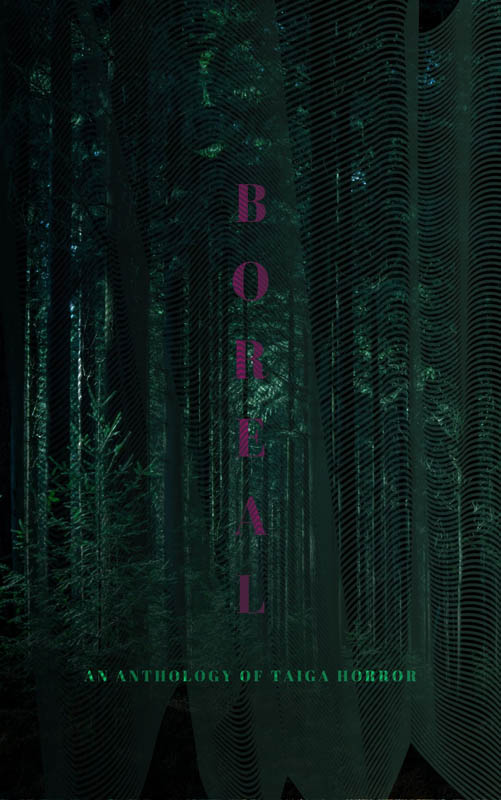
Boreal: an Anthology of Taiga Horror is a collection of twenty-two haunting tales that dwell in the deepest darkest woods and frozen wastelands, edited by Katherine Silva and including Haunted MTL’s very own Daphne Fauber. Each story has even been gifted with its very own poster, hinting at the horrors to be found within it, bestowing a beautiful visual collection as well.
The tales are varied and touch upon the environment in new and different ways, each hearkening to a sort of epiphany or raised awareness. These stories exude both dread and wonder at the smallness of our human existence in contrast to the sacred world we have isolated from, sheltering ourselves in our comfortable houses with centralized heat and everything we could possibly need or want at the ready. The taiga becomes a sanctuary outside of our own dulled awarenesses. It is a holy place imbued with powers beyond mortal human reach, a wilderness that threatens to swallow us – both whole and bit by bit, simultaneously.
The protagonists enter into this realm through ritual, superstition, longing, stubbornness, and their own hubris – yearning to survive its dangers, and to make their own marks upon it. The starkness of their surroundings harbors delicate moments that would be all too easily missed if not deliberately sought or pointed out. The softness of fur, the dappled sunlight shining through trees, the hazy clouds of breath forming in crisp air, the brittleness of bleached bone… those quiet experiences that beg to be forgotten, to lay safely sleeping just below the frozen surface, awaiting spring.
There are those who followed in the footsteps of their predecessors, seeking to escape the constraints of their parent’s and elders’ indoctrination, traditions, madness, and abuse, yearning to find their own way despite also being inextricably bound to their own pasts. There are those who just wanted to go for a walk in the woods, and remained forever changed by what they experienced. There are those who wished to impose their will upon the wilderness, their order falling to disarray, unable to make lasting impact. There are those who sought to leave behind the world of mankind, looking for oneness in the natural order of things through isolation, leaving a bit of themselves behind after being consumed by the terrors they encountered. There are those who truly found communion with the woods, became one with its wildness, and invited its spirit into their hearts to find peace, even at cost of their own lives. And then, there are the spirits themselves…
 (3 / 5)
(3 / 5)
All in all, I give Boreal: an Anthology of Taiga Horror 3.0 Cthulhus. I love existential angst so I found it to be an enjoyable read, and I appreciated the myriad manners in which the biome was explored. But there were points in which I found myself struggling to follow along, as if the words were swept up into their own wilds in ways that alienated myself as reader, as if my mere voyeurism into this otherworldly place was not enough to comprehend the subtle deviations in storytelling mannerisms fully. I suppose in some sense this seems appropriate, but at the same time, it left me feeling a bit unfulfilled, as if I had missed a spiritual connection that should have resonated more deeply.


